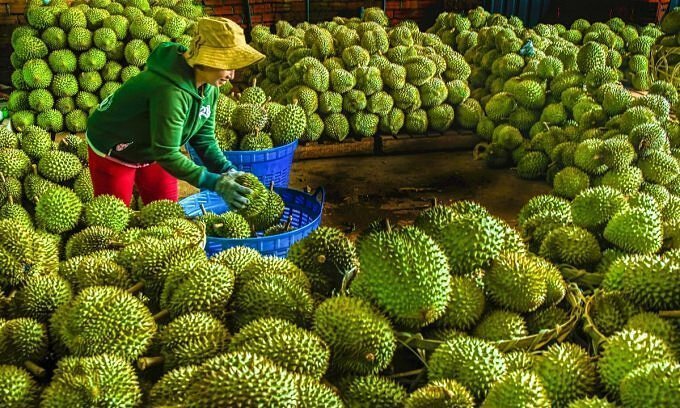The official licensing of frozen durian and fresh coconut for export to China is good news for the country’s agricultural sector. Official export not only opens up opportunities for the durian and coconut industries to create greater added value but is also the most fundamental solution to the problem of agricultural product consumption.

The signing of the Protocol on Plant Inspection, Testing and Food Safety for Frozen Durian has paved the way for the official export of frozen durian to China, extending the list of agricultural products that have been entering this billion-people market through official channels.
Can bring in hundreds of millions of dollars this year
During the state visit of General Secretary and President To Lam to the People’s Republic of China, on August 19, 2024, the Ministry of Agriculture and Rural Development of Vietnam and the General Administration of Customs of China signed the Protocol on inspection, plant quarantine and food safety for frozen durian and the Protocol on plant quarantine requirements for fresh coconuts exported from Vietnam to China.
This move paves the way for the official export of frozen durian and fresh coconut to China, extending the list of agricultural products that have been entering this billion-people market through official channels.
“The official opening of the Chinese market for these two products is expected to create great opportunities for the durian and coconut industries of Vietnam,” said the Plant Protection Department, the technical advisory unit for the two protocols. In the future, the department will continue to organize propaganda, training, and guidance for export units; and closely coordinate with Chinese authorities to ensure the smooth implementation of the protocols, while supporting Vietnamese businesses and farmers to make the most of the opportunities from these protocols.
The Plant Protection Department also said that according to the protocol, frozen durian includes whole durian (with shell), pureed durian (without shell) and durian pulp (without shell), originating from fresh, ripe durian grown in Vietnam. Frozen durian exported from Vietnam to China must be hand-selected to remove rotten, damaged fruits and ensure that there are no foreign metal impurities. Raw materials of frozen durian exported from Vietnam to China must originate from durian gardens registered with the Vietnamese side.
The Vietnamese side will inspect the facilities producing, processing and preserving frozen durian exported from Vietnam to China and introduce qualified enterprises to the Chinese side. Qualified enterprises must be registered with the Chinese side. Only after registration can enterprises export to China. Frozen durian packaging facilities must meet requirements on hygiene, food safety, packaging processes, traceability and food safety and hygiene control processes (HACCP); along with some requirements on freezing capacity and cold storage.
Similarly, fresh coconut growing areas and packaging facilities that want to export to China must also be registered and approved by the Ministry of Agriculture and Rural Development of Vietnam and the General Administration of Customs of China. All growing areas registered for export must establish a quality management system and a traceability system, apply good agricultural practices and maintain good sanitary conditions. Integrated Pest Management (IPM) programs will also be implemented, including regular pest monitoring; physical, chemical or biological control of pests… to avoid or minimize the occurrence of quarantine species that China is concerned about on coconuts.
According to the forecast of the Vietnam Fruit and Vegetable Association, frozen durian exports can reach a turnover of 400-500 million USD this year and will soon be on the list of agricultural export products with a “billion-dollar” value next year. Meanwhile, fresh coconut export turnover could increase by 200-300 million USD in 2024 and continue to grow strongly in the following years – this not only brings economic benefits but also motivates the coconut industry to improve product quality to meet international standards.
“Formalizing” exports
China is currently Vietnam’s largest fruit and vegetable import market. In the first six months of 2024, our country’s fruit and vegetable exports are estimated to reach nearly 3.5 billion USD, an increase of more than 28% over the same period in 2023; of which, the export turnover to China is about 2.2 billion USD, an increase of 33% over the same period in 2023, leading the export markets of this item. Previously, in 2023, fruit and vegetable exports reached a record of 5.69 billion USD, an increase of nearly 70% compared to 2022, with the export turnover to China alone reaching 3.64 billion USD.
According to Mr. Dang Phuc Nguyen, General Secretary of the Vietnam Fruit and Vegetable Association, the good growth in fruit and vegetable exports in recent times is thanks to our successful negotiations and signing of phytosanitary protocols with many countries, especially China.
To date, Vietnam has officially exported 16 types of agricultural products to China, including 15 types of vegetables and fruits, including: sweet potatoes, dragon fruit, longan, rambutan, mango, jackfruit, watermelon, banana, mangosteen, black jelly, lychee, passion fruit, durian, frozen durian and coconut.
Data from China Customs shows that in 2023, Vietnam surpassed Chile, taking second place (after Thailand) in exporting vegetables, tubers, fruits and processed products to this country with a turnover of 3.4 billion USD. Vietnam’s market share in the Chinese market nearly doubled from 8% in 2022 to 14% in 2023.
Obviously, China has always been a large and potential market for Vietnam’s export of goods, especially agricultural products. Bringing Vietnamese agricultural products to China through official channels is a fundamental solution to consume agricultural products. Therefore, how to negotiate early and quickly, speeding up the “officialization” process is the biggest requirement for the agricultural and industrial sectors. 16 agricultural products officially exported to China, with increasing turnover, are remarkable achievements. However, to meet the expectations of farmers and businesses, to “officialize” all types and volumes of agricultural exports, the workload of the agricultural sector is enormous. Especially when China’s requirements are increasingly high, the level of control is increasingly strict; while changing the mindset of agricultural production in our country cannot be done overnight.
Source: https://thesaigontimes.vn/co-hoi-lon-cho-nganh-sau-rieng-va-dua-gia-tang-gia-tri/
